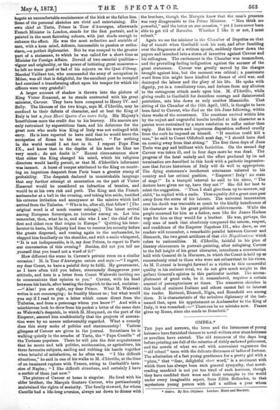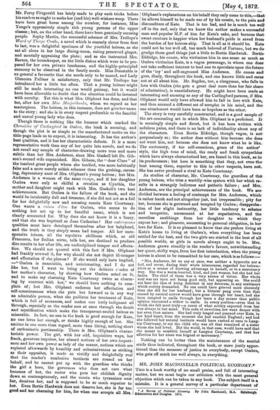OMBRA.*
THE joys and sorrows, the loves and the lornnesses of young heiresses have furnished themes to novel-writers ever since heiresses or novelists have existed. The old romances of the days long before printing are full of the miseries of richly endowed princesses, and the novels of what we call with convenient vagueness the " old school " teem with the delicate distresses of ladies of fortune. The admiration of a fast young gentleman for a pretty girl with a "plum," that "dear, delightful short word," is a sentiment with which there has always been each general sympathy, that novel- reading mankind is not yet too tired of such heroines, though they have confided their woes and their triumphs to the world under every imaginable aspect, from Edith Bellenden, to that mysterious young person with half a million a year whom • Ombra. By Mrs. Oliphant. London: Hurst and Blackett. Mr. Percy Fitzgerald has lately made to play such tricks before his readers as ought to make her (and his) well-wishers weep. There have been great bores among the number, for instance, Miss Yonge's oppressively simple rich young persons of the upper classes ; but, on the other hand, there have been genuinely amusing people. Sophy Martin, the successful schemer of Mrs. Trollope's Ward of Thorpe Combe, a novel which is coarsely clever from first to last, was a delightful specimen of the youthful heiress, as she sat all alone in her large dining-room, eating preserved ginger, and mentally appraising the plate; and as she instructed Mrs. Barnes, the housekeeper, on the little dishes which were to be pre- pared for her own private luncheons, and the highly-principled economy to be observed in the family meals. Miss Dunstable is so general a favourite that she needs only to be named, and Lady Glencora Palliser is satisfactory, only that Mr. Trollope has introduced her a little too often. That a young heiress might still be made interesting no one would gainsay, but it would have been allowable to doubt that the situation could be invested with novelty. Yet this is what Mrs. Oliphant has done, and that too, after her own Miss Marjoribanks, whom we regard as her masterpiece. The heiress, in this instance, does not give her name to the story ; and she is in every respect preferable to the fanciful and unreal young lady who does.
Oliphant's explanations on his behalf they only come to this,—that he allows himself to be made use of by his cousin, to the pain and discomfiture of Kate. That is too bad, and he is much too well off in the end, only that we know the author makes a successful' man and popular M.P. of him for Kate's sake, and because that sweet creature is happier when her husband's pride is saved from the burden of her heiress-ship. That is all as it should be. Kate could not be too well off, too much beloved of Fortune, but we do-
grudge these good things just a little to Bertie Hardwick. Berths Eldridge, his cousin, who victimizes him in one sense as much as Ombra victimizes Kate, is a vague personage, in whom one does not take sufficient interest to lead one to speculate upon the future-
of the 'icy' and self-engrossed Miss Anderson. He comes and goes, dimly, throughout the book, and one knows little and cares not at all about him. Mr. Sugden, too, a clergyman, who falls in love with Ombra (she gets a great deal more than her fair sharer of admiration), is unsatisfactory. He might have been made as interesting and amusing as any of the Carlingford parsons, if We. Oliphant would only have allowed him to fall in love with Kate, and thus aroused a different set of scruples in his mind, and the- one attachment would have been as hopeless as the other.
The story is very carefully constructed, and is a good sample of the art-concealing art in which Mrs. Oliphant is a proficient. It is seemingly simple and direct, but it has been written witlr
sedulous pains, and there is no lack of individuality about any of the characters. Even Bertie Eldridge, though vague, is not so ; the author does without him because she does- not want him, not because she does not know what he is like.. The customary, if too self-conscious, grace of the author'
style, the high tone of mind, the ready and frank sympathies which have always characterized her, are found in this book, as in its predecessors; but here is something that they, not even then best among them, superior to this in other respects, have not.. She has never produced a rival to Kate Courtenay.
As studies of character, Mr. Courtenay, the guardian of thek young heiress, who tries a worldly-wise system with her which re- sults in a strangely ludicrous and pathetic failure ; and Mrs.
Anderson, are the principal achievements of the book. We are- divided between a feeling of contempt for Mrs. Anderson, whisk is rather harsh and not altogether just, but irrepressible ; pity for her, because she is governed and tempted by Ombra; disapproba- tion of her slight insincerity, her little tendency to scheme and temporize, amusement at her superlatives, and the merciless snubbings from her daughter to which they expose her ; and pleasure, amounting to personal obligation, in her love for Kate. It is so pleasant to know that she prefers living at Kate's house to living at Umbra's, when everything has been settled for the beat, and the two girls are started in the best of all possible worlds, as girls in novels always ought to be. Mrs. Anderson grows steadily in the reader's favour, notwithstanding her queer, shifty ways, from her first introduction, when the young heiress is about to be committed to her care, which is as follows :—
" Mrs. Anderson, let us say at once, was neither a hypocrite nor a fool, and never, during their whole intercourse, regarded her heiress- niece as a means of drawing advantage to herself, or in a mercenary way. She was a warm-hearted, kind, and just woman, but she had her faults. The chief of these was a very excess of virtue. Her whole soul was set upon not being good only, but appearing so. She could, not bear the idea of being deficient in any decornm, in any sentiment which society demanded. No one could have grieved more sincerely than she did for her husband ; but a bitterer pang even than that caused by natural sorrow would have gone through her heart, had she been tempted to smile through her tears a day sooner than public opinion warranted a widow to smile. In every position—even that in which she felt most truly—a sense of what society expected from her was always in her mind. This code of unwritten law went deeper with her even than nature. She had truly longed and yearned over Kate, in her kind heart, from the momont she had reached England ; and had she followed her natural instincts would have rushed at once to Lang? ton Courtenay, to see the child who was all that remained of a sister whom she had loved. But the world, in that case, would have said that. she meant to establish herself at Langton Courtenay, and that her affection for-her niece was feigned or mercenary."
Nothing can be better than the maintenance of the mental strife thus indicated, throughout the book, or more justly appor-
tioned than the measure of justice to everybody, except Ombra, who gets off much too well always, in everything.



































 Previous page
Previous page